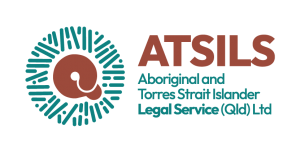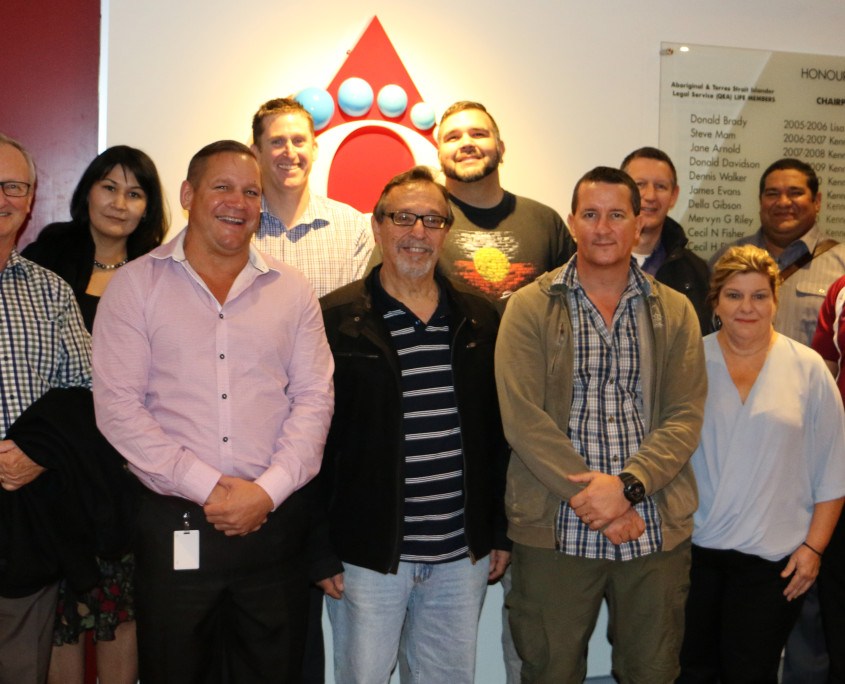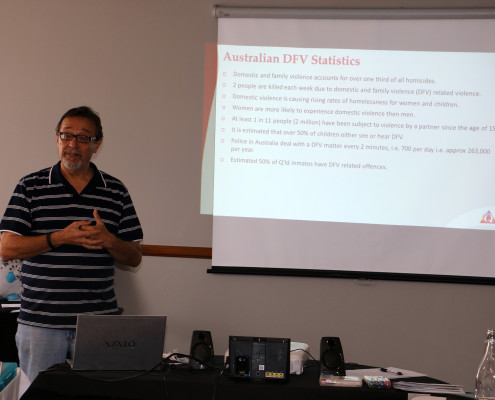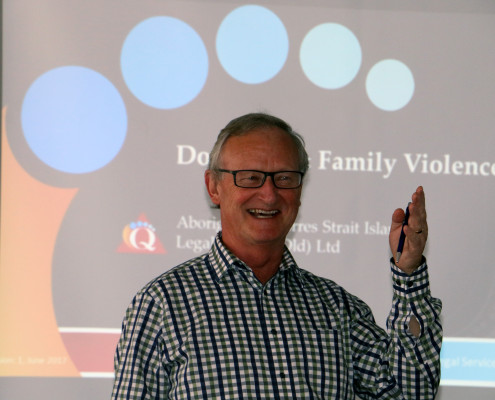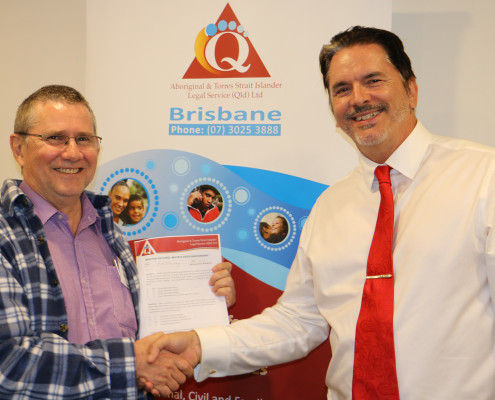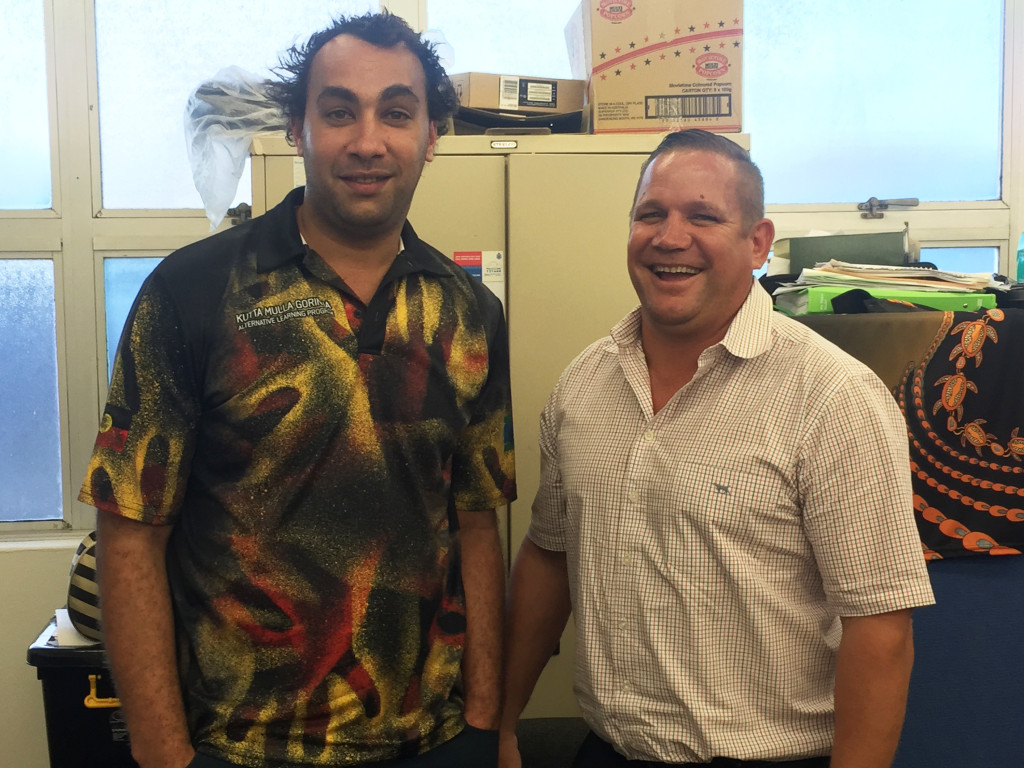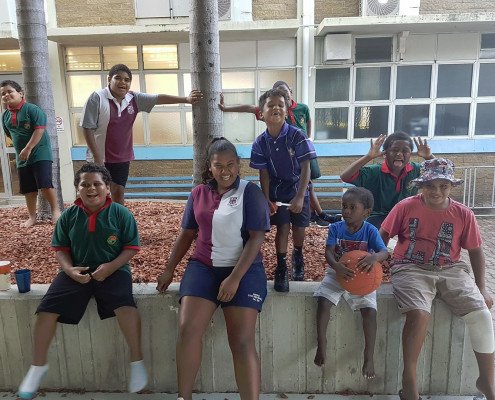We have 3 x Court Support Officer positions available to Aboriginal and/or Torres Strait Islander candidates wanting to make a difference for their people in the justice system.
Apps close 1 Aug 2017
Our team of Court Support officers are integral to delivery of our culturally competent legal services.They all identify as Aboriginal and/or Torres Strait Islander and are usually local people with strong connection to the community who are highly skilled at engaging mob and ensuring they understand their legal rights.
Interested in working with ATSILS?
In the video below you can hear from the team about what it’s like working for ATSILS, a long established human rights based organisation offering rewarding legal careers across civil, family and criminal law areas.
Currently we have a number of positions available for Legal Practitioners across criminal, civil and family law jurisdictions. In addition we have a range of Court Support Officer positions available to Aboriginal and/or Torres Strait Islander candidates wanting enhance access to justice for the most vulnerable in our communities.
View our current job vacancies page here: https://atsils.org.au/job-vacancies/
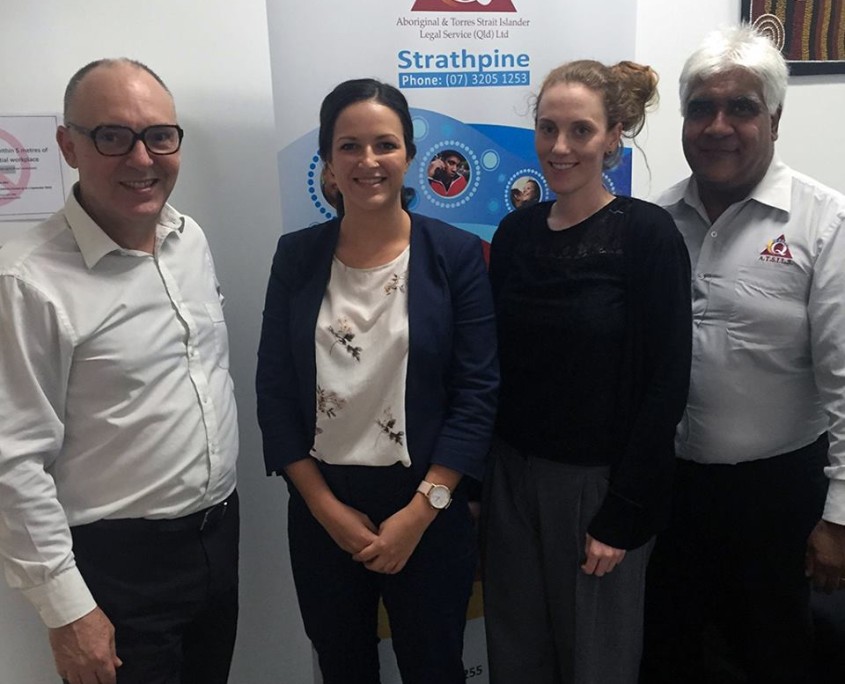 Student placements with a human rights based organisation like ATSILS are an important element in inspiring the next generation of legal practitioners on a path of social justice for Aboriginal and Torres Strait Islander people. Recently our Strathpine Office had he pleasure of hosting Tayleigh who is in the final stages of her law degree at the University of the Sunshine Coast.
Student placements with a human rights based organisation like ATSILS are an important element in inspiring the next generation of legal practitioners on a path of social justice for Aboriginal and Torres Strait Islander people. Recently our Strathpine Office had he pleasure of hosting Tayleigh who is in the final stages of her law degree at the University of the Sunshine Coast.
Reflecting on her 3-month placement Tayleigh said that she has learnt so much about the court processes, clients and also the organisations policies, procedures and administration. She got to attend court at Pine Rivers, Sandgate and Redcliffe, and was able to accompany staff on watch house visits and take part in video link interviews with clients.
She said it was a real eye opener to witness the social disadvantage and legal issues effecting Aboriginal and Torres Strait Islander clients. She loved the teamwork and environment at the Strathpine Office who work tirelessly to ensure the legal rights of the local community are protected. Tayleigh said she would highly recommend a student placement with ATSILS to any individual with an interest in social justice.
Further, with Adam Chapman (pictured, Right) studying his law degree while working as our Court Support Officer, having students to assist the team supports a two-way learning approach. Mr Andrew Ferrett, our Regional Manager (pictured, Left) is an attentive, interactive and well-respected student supervisor. Also pictured is Jasmine Ross (Right of Centre) who commenced with us as a Practical Legal Training student, and now works with us.
Interested in a Student Placement with ATSILS? Find out more:
https://atsils.org.au/student-placements/
 This week a new Murri Court was launched in Gubbi Gubbi/Kabi Kabi country at Maroochydore Magistrates Court on the Sunshine Coast. It was great to come together with local Elders, community and legal fraternity to celebrate the official opening of this vitally important justice alternative.
This week a new Murri Court was launched in Gubbi Gubbi/Kabi Kabi country at Maroochydore Magistrates Court on the Sunshine Coast. It was great to come together with local Elders, community and legal fraternity to celebrate the official opening of this vitally important justice alternative.
Murri Court is a critical element in creating a more culturally responsive justice system. It is designed to link Aboriginal and Torres Strait Islander defendants to relative cultural and support services to help them make changes in their lives needed to break their cycle of offending.
Read More:
Murri Court in the media:
http://www.abc.net.au/news/2017-06-07/murri-court-look-inside-indigenous-queensland-court/8555416
https://www.thechronicle.com.au/news/kev-rose-challenge-atsils/3186508/
What is Murri Court?
Find out more about Murri Court:
http://www.courts.qld.gov.au/courts/murri-court/about-murri-court
Last week our leaders from across the State came together for a 2 day Managers’ workshop in Brisbane. The Managers’ were updated on data definitions related to service provision by our Principal Legal Officer Greg; given insight into activity around Communications and Sector Engagement by Graham; and had lengthy discussions regarding recruitment practices, cultural competence and our commitment to workforce development with our CEO – Shane and Human Resources Manager – Jane.
The workshop was held with fantastic collegiate spirit and it was a great opportunity for our Regional Managers, Directors of Law and Program Managers to share ideas on service delivery needs and solutions, and stay up to date with key management policies to ensure our organisation is compliant with funding agreements and tuned to the diverse needs of our communities across Queensland.
For more ATSILS news visit:
https://www.facebook.com/atsils/
Recently ATSILS Communication and Sector Engagement Team met had met with Justin Giblett Coordinator of Kutta Mulla Gorinna (KMG), a deadly alternative learning program supporting and empowering our young ones to stay in contact with education and chase their dreams.
The program started in 2015 and it’s supportive and flexible approach to learning has attracted a number of disengaged/high risk youth back to an education pathway, diverted them away from the justice system and is achieving great attendance rates of between 80-90%. Despite its success however, the program has faced a constant battle in attracting regular funding and is in danger of closing its doors.
Aboriginal and Torres Strait Islander young people are significantly over-represented in the criminal justice system and are 24x more likely than non-indigenous juveniles to be in detention. As the QLD Government & other governments around the nation look to justice/social reinvestment solutions to address this issue, it is critical they invest and support programs like KMG already making a difference in their local community.
Justice Reinvestment is a holistic approach that see funds diverted away from prisons and towards programs that address disadvantage and the root causes of crime. For Aboriginal and Torres Strait Islander communities, these programs must be locally designed and community led to be effective.
KMG as a great example of a community designed and led initiative that can steer our youth away from the criminal justice system through education and create effective pathways to future employment for vulnerable kids.
Follow and support their great work here:
View Article: ‘At-risk’ kids could lose their final school’
https://www.cqnews.com.au/news/at-risk-kids-could-lose-their-final-school/3174236/#more-replies
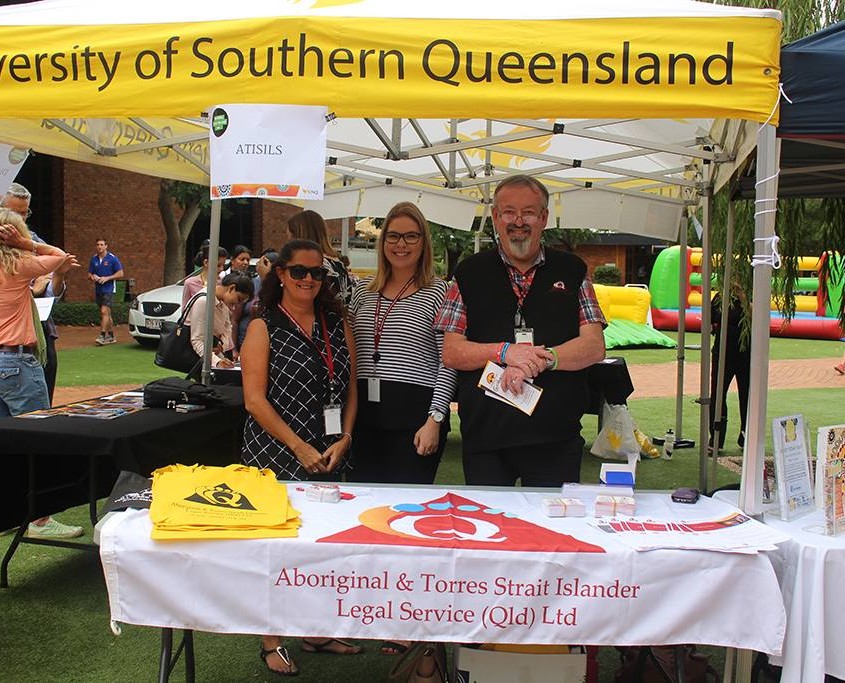 Chelsea, Josie and Kevin from our Toowoomba office were out in the local community for Close The Gap Day.
Chelsea, Josie and Kevin from our Toowoomba office were out in the local community for Close The Gap Day.
The team hosted a stall at the University of Southern Queensland campus and had a great day showing support for this important cause whilst raising awareness of our broad range of services.
The ever widening justice gap faced by Aboriginal and Torres Strait Islander communities is intrinsically linked to poor health outcomes. Promoting access to quality legal assistance and legal education resources can work to address disadvantage in vulnerable communities and can help close the gap not only in justice, but in health as well.
Addressing violence against Aboriginal and Torres Strait Islander women and rising imprisonment rates requires a nuanced approach, according to Antoinette Braybrook and Shane Duffy, Co-Chairs of the Change the Record Coalition.
This article is part of a #JustJustice series running at Croakey this week to coincide with Guardian Australia’s Breaking the Cycle project (which is featuring a number of #JustJustice articles), and to mark the publication of the second edition of the #JustJustice book.
Antoinette Braybrook and Shane Duffy write:
In recent months we have seen a renewed and welcome discussion about the crisis of violence against Aboriginal and Torres Strait Islander women. What we need now is for all levels of government to start listening to peak and representative Aboriginal and Torres Strait Islander organisations, so that we can work together to address the unacceptably high rates of violence towards our women and children.
We all want to live in a safe community – with less crime and fewer victims. As a result we often default to the assumption that locking up as many people as possible will keep us safe.
But the evidence proves otherwise, with punitive approaches often compounding underlying issues. If we really want to address both rates of violence and rising imprisonment rates, we need to adopt a more nuanced approach.
Since our launch in April 2015, the Change the Record campaign has been working towards twin goals – to stop the disproportionate rates of violence against Aboriginal and Torres Strait Islander women and children, and to end the over-imprisonment of Aboriginal and Torres Strait Islander people.
These two goals are mutually reinforcing in a number of ways. Family violence is both a cause and a consequence of imprisonment. Our women are at the epicentre of the national family violence crisis. Aboriginal and Torres Strait Islander women are currently 34 times more likely to be hospitalised as a result of family violence than non-Indigenous women and 10 times more likely to be killed as a result of violent assault.
However, it is important to note that the Aboriginal and Torres Strait Islander women who access our services experience family violence at the hands of men from a range of different backgrounds and cultures.
Underlying, interlinked root causes to violence, prison rates
At the same time, Aboriginal and Torres Strait Islander women also represent the fastest growing prison population in Australia and it is estimated that around 90 percent of our women in prison have previously been a victim/survivor of family violence.
The experience of women accessing our services tells us that, more often than not, the criminal justice system fails to protect women from family violence, with punitive approaches providing an incomplete response to stopping the violence.
Both violence and imprisonment rates are also driven by a range of underlying and interlinked root causes, such as mental health, substance abuse, homelessness, poverty, family violence, exposure to the child protection system and other factors.
If we want our justice system to work, we need to recognise and respond to the complex needs of the individuals involved. For instance, the resources that are currently put into imprisoning our people could be better spent on investment into holistic wrap-around family violence services that aim to build resilience and reduce offending.
This includes for example a focus on prevention and early intervention programs, such as Family Violence Prevention and Legal Service Victoria’s Sisters Day Out program or Central Australian Aboriginal Legal Aid Service’s Kunga Stopping Violence Project.
We need Governments to shift their focus away from responding after an offence has been committed, towards investing in services which build communities, reduce violence and prevent offending from occurring in the first place.
Turn-away rates of 30-40 per cent
An example of the complexity of these issues is the story of Ms Dhu – a young, vulnerable Aboriginal woman who tragically died in police custody after being imprisoned for unpaid fines. At the time of her arrest, she was only 22 years of age and was a victim of domestic violence. She was arrested at the same time as the perpetrator and locked up in a police cell adjoining his.
The sad reality is that Ms Dhu should never have been arrested and she certainly should not have been locked up. Instead, she should have been provided access to holistic family violence support services – such as access to safe housing, community services, legal assistance and prevention and early intervention programs.
However, chronic under-funding and budgetary cuts to services means that we currently don’t have capacity to meet demand. For example, Aboriginal Family Violence Prevention Legal Services (FVPLS) around the country are currently reporting a turn away rate of 30-40 percent because they are so under-resourced.
As Aboriginal and Torres Strait Islander people we both know first-hand the pain that is caused by violence against our women and children, and we want the violence to stop. But we also know from personal experience the ongoing impact of intergenerational trauma, mental health issues and the breakdown of our communities that is caused by the escalating over-imprisonment of our people.
Talking about addressing violence and imprisonment rates in tandem is difficult but, if we are to make progress in this area, it is critical that we adopt a balanced response which tackles these dual issues head on.
We don’t need more knee-jerk, ill-considered policies. It is essential that peak Aboriginal and Torres Strait Islander organisations are front and centre in the solutions. Governments must meaningfully engage with the experts in frontline service delivery rather than seeing them as an afterthought.
Continuously defaulting to a simplistic ‘law and order’ approach only perpetuates cycles of trauma and disadvantage, and will not make our communities safer in the long-term.
It is in all of our interests to work together to develop smarter approaches, which are targeted at addressing the underlying causes of crime. This approach will not only cut offending and imprisonment rates, but critically will also increase safety by working to address the root causes of violence against women and children in the first place.
Antoinette Braybrook and Shane Duffy are Co-Chairs of the Change the Record Coalition.
View on Croakey: https://croakey.org/calling-for-smarter-approaches-to-violence-offending-that-address-underlying-causes-of-crime/
